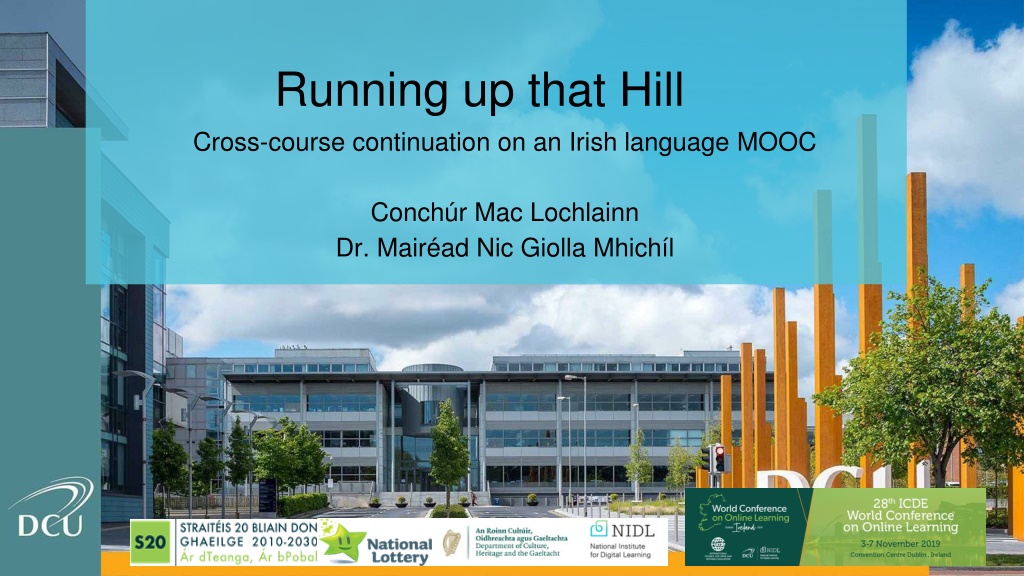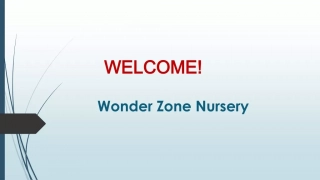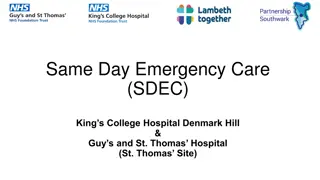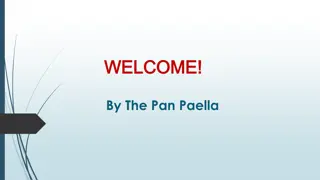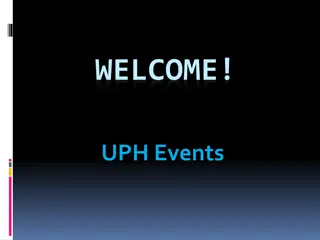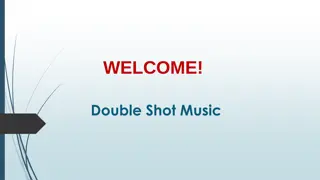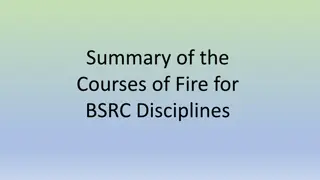Running up that Hill
Language MOOCs and their impact on learners' engagement and persistence. Delve into factors motivating or demotivating continued participation. Survey data sheds light on learner behavior and trends
Download Presentation

Please find below an Image/Link to download the presentation.
The content on the website is provided AS IS for your information and personal use only. It may not be sold, licensed, or shared on other websites without obtaining consent from the author. Download presentation by click this link. If you encounter any issues during the download, it is possible that the publisher has removed the file from their server.
E N D
Presentation Transcript
Running up that Hill Cross-course continuation on an Irish language MOOC Conch r Mac Lochlainn Dr. Mair ad Nic Giolla Mhich l
Irish 101 and Filte ar Lne - Blended cultural and language learning courses. - Part of the wider F ilte ar L ne project, co-funded by the Irish Government, Department of Culture, Heritage, and the Gaeltacht, under the Twenty-Year strategy for the Irish Language, with support from the Irish National Lottery. - Currently running eight live courses teaching to level A2 proficiency, under the Common European Framework of Reference.
MOOC dropout and completion Important theoretical (see Khalil and Ebner, 2014) and discoursal (see Murray, 2019) debate relates to completion on MOOCs but the topic is clearly complex. What learners want may vary hugely, both from each other and from course designers Some signs of research movement towards considering relative goals/intentions as more immediately relevant (Henderikx, Kreijn and Kalz, 2018).
Continuation and persistence Serial or persistent MOOC learners are important empirical cases which are underexplored. General gap in knowledge: the role of stratified series of courses on continuation. Credit Shutterstock.com
Practical importance learning design Assumed persistence has a clear role in learning design are learners truly up to date on later courses? Rise of staggered, multi-MOOC courses (such as Irish 101-108) makes question of direct practical relevance. To what degree can (or should) churn be accommodated?
RQs RQ. 1 Given our interest in sustained learning, what patterns of prior engagement are visible amongst learners on each MOOC? RQ. 2 Amongst those who have continued, what specific factors appear either motivating or de- motivating?
Data collection Survey placed at start of each course, measuring psychometric properties, primarily. Surveys placed in Irish 101-104 and Irish 108. Total responses n= 1,153 (majority on Irish 101).
Example of survey instrument ->
Answer Diversity Irish 104 I have completed Irish 103 I have started but not completed Irish 103 I have completed Irish 101,I have completed Irish 102 I have completed Irish 101,I have completed Irish 103 I have started but not completed Irish 101 I have completed Irish 101,I have completed Irish 102,I have started but not completed Irish 103 I have completed Irish 102,I have completed Irish 103 I have completed Irish 101 I have started but not completed Irish 101,I have started but not completed Irish 102,I have started but not completed Irish 103 I have completed Irish 102,I have started but not completed Irish 103 I have completed Irish 101,I have started but not completed Irish 101,I have completed Irish 102,I have started but not completed Irish 102,I have completed Irish 103 I have completed Irish 101,I have started but not completed Irish 102 I have completed Irish 101,I have started but not completed Irish 101,I have completed Irish 102,I have started but not completed Irish 102,I have completed Irish 103,I have started but not completed Irish 103 I have started but not completed Irish 101,I have completed Irish 103 I have started but not completed Irish 101,I have started but not completed Irish 102,I have completed Irish 103
Learner experiences Plenty of examples of motivation increasing due to participation, or expansion of initial goals: In general my motivation has increased. I originally started Irish 101 with the intention of learnng a little ABOUT Irish, rather than studying the language in any depth. But I''m still here (beginning 104) so I'm obviously taking the subject rather more seriously now than I expected to. Learner A. You provide not merely a single course, but a sequence of courses. I find this quite encouraging and challenging. Learner B.
The question of time It was more difficult that I initially thought, but I enjoyed learning Irish and I'm determined to finish all the courses and at least have some knowledge of the language. I rushed through Irish 101 because I'm behind schedule and that didn't help, but I'd like to review the content as soon as I catch up. I think once I let the content sink in it'll be a bit easier and I'll enjoy it even more. Learner C. I would have liked to have more time with the previous online course, but it was enjoyable and a refreshing change from book-and- worksheets based learning. Learner D. I am one week behind. I find there is too much to cover when I have a full time job as well! Learner E.
Implications for learning design a more complex picture emerges of students refining their course commitments over time, shedding some and investing in others. - (Veletsianos, Reich and Pasquini (2016: 7). Learners on suites of MOOCs arrive to specific points through very different paths. Catering to these diverse goals/experiences reflects the challenge of scale. Clear temporal issues effect continuation, in keeping with literature on issue (for example Zheng et al, 2015, Eriksson, Adawi and Stohr, 2017)
Limitations and future research This sample are likely more motivated or engaged than the typical MOOC learner on Irish 101-8, by virtue of completing the survey. Much more research needed at a more contextual level, including in depth-qualitative studies. Understanding those who drop out in more detail may be the key .
Go raibh mle maith agaibh! Twitter: @Maclocc3 Email: conchur.maclochlainn@dcu.ie
References Eriksson, T., Adawi, T., and Stohr, C. 2017. Time is the bottleneck : a qualitative study exploring why learners drop out of MOOCs. Journal of Computing in Higher Education, Vol. 29. PP 133-146. Henderickx, M., Kreijn, K., and Kalz, K. 2018. Refining success and dropout in Massive Open Online Courses. Distance Education, Vol. 38, No.3. PP 353- 368. Khalil, H. and Ebner, M.. 2014. MOOC completion rates and possible methods to improve retention a literature review. In Proceedings of World Conference on Educational Multimedia, Hypermedia and Telecommunications . PP 1236-1244. Murray, Seb. 2019. MOOCs struggle to lift rock-bottom completion rates . The Financial Times. Available at - https://www.ft.com/content/60e90be2-1a77- 11e9-b191-175523b59d1d Veletsianos, G., Reich, J., and Pasquini, L. 2016. The life between big data log events: Learners strategies to overcome challenges in MOOCs. AERA Open, Vol. 2 (3). PP 1-10. Zheng, S., Rosson, M. B., Shih, P. C., & Carroll, J. M. 2015. Understanding student motivation, behaviors and perceptions in MOOCs. In Proceedings of the 18th ACM conference on computer supported cooperative work & social computing (pp. 1882 1895).
